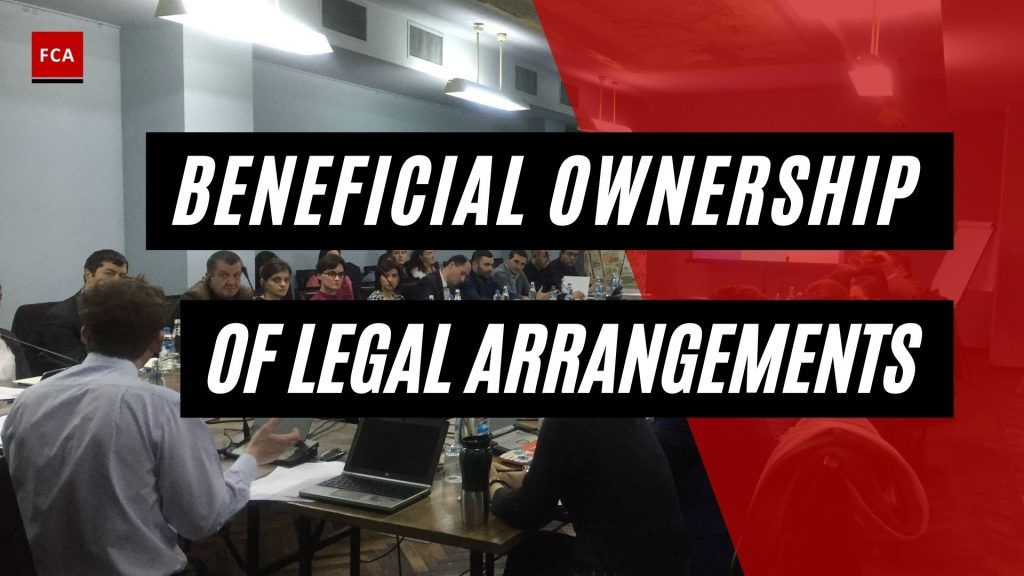Beneficial ownership of legal arrangements. Organizations should take steps to avoid the use of legal persons for ML/TF purposes. Management should guarantee that there is sufficient, accurate, and timely information on the beneficial ownership and control of legal entities that competent authorities can get or access in a timely manner.
Beneficial Ownership Of Legal Arrangements
Beneficial owner, about a company or LLP, means:
- any person who owns or controls (whether directly or indirectly), including through bearer shareholdings or by other means, more than 25% of the shares or voting rights in the company or LLP;
- any person who controls the company or LLP, or
- any person who exercises control over the management of the company or LLP.

Beneficial Ownership In Case Of Partnership:
In the case of a partnership, the term “beneficial owner” refers to someone who is ultimately entitled to or controls (whether directly or indirectly) more than 25% of the partnership’s capital or earnings or more than 25% of the voting rights.
Countries with legal persons that can issue bearer shares or bearer share warrants or that allow nominee shareholders or nominee directors, in particular, should take comprehensive measures to guarantee that they are not utilized for money laundering or terrorist financing.
It is difficult for many companies to get down to the nitty-gritty. Manually identifying UBO and its attributes (confirming self-certified information such as company name, address, and registration data), verifying those qualities (such as ownership levels and financial reports), and, if required, conduct EED.
Measures to facilitate control information
Organizations should consider measures to facilitate access to beneficial ownership and control information by financial institutions (FIs) and designated non-financial businesses and professions (DNFBPs). Concerning the beneficial ownership information, organizations should ensure that either information on the beneficial ownership of a legal entity or a company is obtained by that entity or company and verified from the available public information and searches.
To meet such requirements, countries should use one or more of the following mechanisms:
- requiring company registries to obtain and hold up-to-date information on the companies’ beneficial ownership;
- requiring companies to obtain and hold up-to-date information on the companies’ beneficial ownership or companies to take reasonable measures to obtain and hold up-to-date information on the companies’ beneficial ownership;
- using existing information, including:
i. information obtained by organizations, initially before customer onboarding;
ii. information held by other competent authorities on the legal matters related to the companies;
iii. information held by the company as required; and
iv. available information on companies listed on a stock exchange, where disclosure requirements ensure adequate transparency of beneficial ownership.
Three options for facilitating
Regardless of which of the above mechanisms the organizations need to establish mechanisms to ensure that companies co-operate with competent authorities to the fullest extent possible in determining the beneficial owner. The organizations generally have three options for facilitating such cooperation which may be used alone or in combination.
a) Require companies to authorize at least one natural person resident in the country of incorporation to be accountable to the competent authorities for providing all basic information and available beneficial ownership information, and giving further assistance to the authorities as needed.
b) Require companies to authorize a DNFBP in the country to be accountable to the competent authorities for providing such information and assistance.
c) Take other comparable measures which can effectively ensure a company’s co-operation.
The organization must keep the purpose clear, which is to:
- Determine who your customers’ beneficial owners are;
- Assess the level of money laundering/terrorism financing risk your customers’ beneficial owners pose to your business or organization;
- Verify the identity of your customers’ beneficial owners;
- Keep records of how you identified each beneficial owner and verified their identity.
Final Thoughts
Every organization should consider measures or take steps to prevent the use of legal persons for ML/TF purposes. This article elaborates on ‘Beneficial Ownership Of Legal Arranges’ as a CDD requirement. Accurate, sufficient and timely information on the beneficial ownership should be guaranteed by the management.








